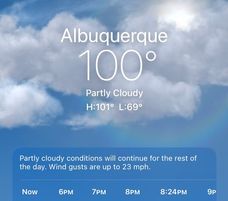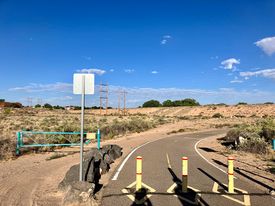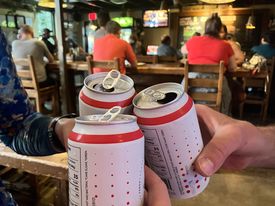How Many Yards Are in a Mile?
- julietertin

- Jul 10, 2023
- 6 min read

Confession: I tried to withdraw from the Ironman. A few weeks ago, I decided I didn't want to do it anymore because I really want to do one thing, and that's run trails that go up mountains. Ironman said that's fine, we'll keep $500. So I doubled down and said no, I'll spend another $1000 on gear and travel and lodging to do your stupid race. Yeah, take that.
Ironically, until I busted up my ankle and was literally dragging my right foot around in a boot did I stop dragging my feet about training. Four out of four doc appointments have not gone well, and three have ended in x-rays (three!). The last one concluded with an MRI to look for a little chip floating around (let's hope there's not). No impact movements, no PT exercises, no running scribbled on the sched. I definitely didn't hobble to my car and cry a little before coming home.
I don't know if you like trashy TV, but I do. It's such a rare thing that I have time to sit down and watch garbage that it's like sitting down to an entire cheesecake. It's way too much and way too sugary, but let's binge Iron Chef anyway. Competitive reality shows almost all follow the same premise: here's the challenge, here's something horrendous or impossible or improbable to deal with, and winner gets the prize. It's always the people with the worst circumstances that pull the win (or fail spectacularly). Sometimes I think of that when life unveils the sardines and ghee.
Since my last post, I figured I should start swimming. It hurts to kick, but I can drag my foot. I looked at the poster on the pool wall, set my watch to 25 yards, and jumped in. After a few laps, the old guy next to me said I was a terrific swimmer and that he was just learning. I smiled and said yeah, me too bud. Then he asked if I wanted to swim with his whiffle balls, which he had clenched in both fists. I did not particularly want to swim with his whiffle balls, but he was very nice and probably 75 years old, so I graciously took them and tried a few laps. I had no idea why we were doing that, but the next week my friend Lauren swam drills with her fists to improve her forearm output, so I assume my friend was supposed to be doing that too. Maybe I'll get her some whiffle balls.

On my second swim I learned to reach and roll.
On my third swim I learned to breath every third stroke (I don't always do this) and try harder. Swim faster.
On my fourth swim I learned to breathe out evenly, that I love swimming, and that I need a swim cap.

I don't mean I'm talented. I am pretty sure my butt still sinks, I only kick with one foot, plus I'm terrible at holding my breath. But, I have a huge advantage.
Kids up north stop wearing underwear about the end of May. As soon as school ends we exclusively move down to the swimsuit drawer until Labor Day. If you grow up around 10,000 lakes (actually 11,842 lakes), you spend a lot of time in them. My family didn't live on a lake or have lots of money, and we had three boats and two canoes. I used to sit outside the house waiting for my dad to come home from work, so I could beg him to take me on the lake. Water is important up north.
I work three jobs, I'm a stepmom to a teenager, I go to recovery meetings, I have a dog velcroed to me, my husband works at home with me half of the time, I go to weekly group rides, and I can't run right now. For an introverted creative person, this is zero time alone in my head. The water blocks everyone out, just for a few minutes.
One of my jobs is coaching ultras. Part of that conversation has to center around mentality (a lot of what I coach ties to mentality) which includes an analysis of ego vs. humility. It's sneaky. If you asked ultrarunners to list ten reasons they'd DNF a race, 'ego' wouldn't even make the list. It sits buried, like a landmine. That conversation naturally wanders over to the topic of pride: is ego = hubris? Is hubris = pride? Is pride good, or is it bad? Are there types of pride? And so on.
I submit to you the advice I most recently gave an athlete going after his first fifty miler:
You're going to have to invite the discomfort to pull up a chair. Listen to it. Learn from it. Be curious. Don't excuse yourself; a million things could happen, but it still comes down to how you handle it. Take pride in that level of accountability. Control your thoughts: don't let them blame weather, slowness, hunger. Even those of us with the most integrity have doubts at high altitude. Reign them in, and whip them to go faster.
Did you catch it?
So much of our conditioning says this: do good and you are good.
You are only as perfect as your actions.
Take pride in that level of accountability.
The fact that you are holding yourself accountable to tackle huge goals, or work, or challenge, or fear, or pursuit speaks volumes about your values. To take it on (everyone has a different it) willingly - with humility and curiosity - is huge. Do the heavy lifting. Welcome the growing pains, agonizing as they may be.
Compare the effort of the first guy at a marathon and the last guy at a marathon. Who wore it best? Maybe the last guy lost 100 pounds and has been learning how to run for a year leading up to this. Should his pride be less because his time was the worst? Pride is a ratio.
Your data don't mean jack. Who cares what the Strava leaderboard says. If you embrace this mentality (this is just one of many, but I find it a useful one) your ability to venture into unknown places with courage grows. Your fear of failure lessens. Your pride is tied to your effort and bravery, rather than dangling off your accomplishment (or devastated by your failure). The pressure on outcomes diminish. If you are perfectionistic like me, this is very hard to absorb. My value is my performance.
As a drunk years into recovery, this is even harder for me. If I drink I fail, if I recover I succeed. All of my worth was tied to an addiction that I failed at so many times (did I say 'so many'? so many). You can guess how that effected my self-worth. This thinking is short-sighted.
With real humility I will share that I've won races and set course records, but really, if you think that's very important stuff than I think, my friend, you are mistaken. That isn't it. It wasn't the last time I stopped drinking that mattered; it was all of the times. Every time mattered to me. Every time I tried, and failed, I got closer to the final try.
I love competing, but I still challenge you to consider the motivation behind it. It's healthy to question yourself. What is the stress all for? Is it productive? I'm in a place now where separating all of these ideas: your ego, your pride, your willingness, your goals, and looking at them individually is much more productive. I don't mean settle for mediocre. Hell no. But I do mean that other people's measuring sticks are a waste of time. There is value in the exercise, not just the finish line.
The point isn't to say I can run 100 miles, I can do anything. The message is so different: I'm willing to try as hard as I can even if I fail at a new thing. The point is to be brave, not comfortable.
Remind me to tell you about the ice cube. I have more ideas about discomfort and I promise they aren't what you expect.
PS The biking is going.... great.
PPS the biking is not going great. I kind of like my bike now, and I still get flats, but I'm slow. I don't want to be so slow. I'll keep trying.

PPPS Pricky Pear kombucha is top notch.






Comments